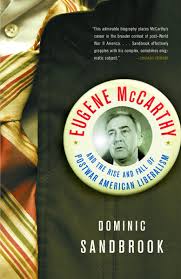Eugene McCarthy: The Rise And Fall of Post-war American Liberalism (2005) by Dominic Sandbrook
Good Reads meta-data is 402 pages, rated 3.74 by 85 litizens.
Genre: Biography.
Verdict: Speaks Minnesotan.
Tagline: Hindsight aplenty.
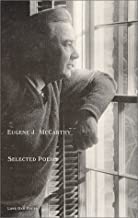
I was looking for a biography of the man and found this to be the best bet, though the author specifically sets aside the label biography, still there is much biography in it.
Starting points:
1 born to farmers and farmed himself as a young married man
2 considered monastic life seriously enough to start on it for a year Benedictine
3 college school teacher
4 disciplined, serious, spare (no rhetorical flourishes), used to being in front of room of young people. – be on time, target, and budget (both as farmer and teacher)
5 ready to do the work without the limelight monastic modesty
6 compromise is a good not an ill, and necessary because everything is not malleable (farm)
7 In the US Navy he was a code breaker
Personally got on well with Southern conservative democrats as well as liberal Republicans like Harold Stassen. (And like Stassen he became addicted to running for president in later life.)
Got bored in four terms in House of Representatives so tried for the Senate with the support of organised labor and he unseated an incumbent Republican. Became easily bored and more ambitious, these traits stayed with him. The more he interacted with more senior leaders the more he saw himself taking a place among them: Ego now enters the equation.
The feet of clay that are relentlessly examined in this book show him to be a man who, finding things coming to him easily, developed hubris. All that is said, repeatedly, yet the fact remains he did what no one else would do in challenging a sitting president from his own party almost single handed at the beginning. He did indeed stand up alone.
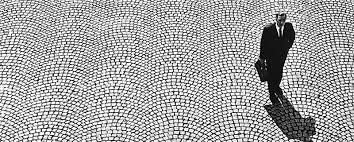
Remind me who has done that since. As the Senator said himself as the dust of 1968 settled: ‘I may not have been the best man to make it [the challenge], but I was the only one who was willing to try.’
Of course, there was no chance he would secure the nomination from the Democratic Party as he often said himself. His purpose was to present an articulate, identify, and mobilise an alternative. That he certainly did. The dynamics of the following campaign in 1968 are many. First the incumbent president withdrew, and then another candidate was murdered. While that makes the whole thing seem chaotic, as the author shows and as McCarthy said many times first Johnson and then Humphrey would secure the nomination. What McCarthy’s campaign could do however was to influence changes in policy, program, and personnel.
At the outset his campaign had been single-issue of the Vietnam War, then with Johnson’s withdrawal it shifted to a campaign about the office of president itself to be less an executive and more a chairman of a board. McCarthy did not handle either the entry and then demise of Robert Kennedy with any intelligence or decorum, but then who did.
His campaign was disorganised and disjointed in itself with managers, writers, canvassers, and pollers coming and going. While funding was reasonable, talent was in shorter supply. But in any event McCarthy seldom took advice from members of his campaign. That led to frustration on both sides.
Somewhat inadvertently the author shows that the qualities that gave McCarthy credibility also meant he could not win. He was distant, aloof, intellectual, poetry-quoting and he just did not do the handshaking a candidate is supposed to do, but he did autograph the book I had. On many occasions late in the going when given a chance to state his case he simply replied ‘People know my position.’
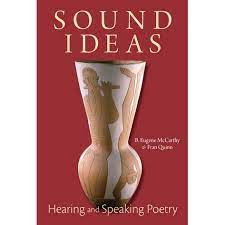
In his personal manner he was detached and reserved rather like John Kennedy, whereas Robert Kennedy became a firebrand, often without focus. McCarthy’s appeal was cerebral; Robert Kennedy’s was visceral.
There is some speculation prior to Kennedy’s death that Humphrey and Kennedy would arrive at a stand-off in the convention, and McCarthy might then be a compromise both sides would accept: A straw in the wind of fate. This line is pursued on several alternative history web sites for those who wish to consider it.
Realising the cause was all but lost after June, he did less and less. Instead of handshaking at factories, school, or sidewalks, instead of prepping for interviews, instead of going here and there to meet labor leaders or black communities, he would read poetry, and worse, per our author, write poetry.
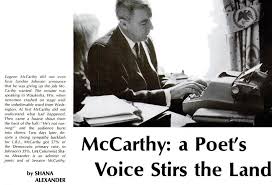
In paraphrase I’ll give his fellow Minnesotan Garrison Keillor the last words here on McCarthy:
He was the last man in American public life to quote from Yeats or Frost, and to do so because he had read their poetry not because a speechwriter had inserted it.
While this book more than once dismisses McCarthy’s poetry in 1968 both Time Magazine and the New York Times labeled him as that. In that whimsical manner that so irritates the author on his nomination papers in the primaries he often listed his occupation as ‘Poet, unpublished.’

